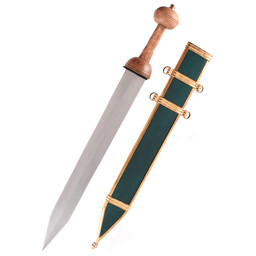Product description
The gladius was the most frequently used weapon of Roman legionaries from the 3rd century BC. until approx. the 3rd century AD. Different types of gladii have been found in several regions of the Roman Empire, named after the region where they were found. The weapon was designed for stabbing and slashing in close combat. The successor to the gladius was the spatha, a longer type of sword.
This gladius is a replica of an original from the first century AD, found in the Thames in Fulham (London) in 1883. The gladius is now exhibited in the British Museum in London. The Fulham type gladius is a transitional type between the Mainz and Pompeii types, but is considered by some historians to be a variation within the Mainz type.
This replica has a blade made of EN45 spring steel. It has a full tang with a screwed pommel. The hilt is made of wood and the gladius is delivered including a brown leather scabbard with brass fittings. The scabbard also has brass rings for fastening the gladius to a belt.
Details:
Material: EN45 spring steel, wood, brass, leather
Edge: semi-sharp (for decorative use only)
Length: 71 cm
Blade length: 52 cm
Grip length: 9,5 cm
Max. blade width: 5 cm
Point of balance: approx. 11 cm under hilt
Including leather scabbard
Weight: 0,65 kg (1,1 kg with scabbard)
Based on a historical original
Transport weight (gram): 2000 *
We do not sell this product to customers under the age of 18. Click here for more information on the European arms acts.
This item is produced in limited quantities only. This means that every piece is unique. Sizes & finish may vary lightly from piece to piece.
Prevent rust and corrosion by oiling your weapons regularly. Remove rust easily with black sandpaper. Remove burrs with a whetstone. Make sure you have removed all burrs before using a battle-ready weapon, as they can cause wounds.
Maintenance & care
Just as with weaponry, you can care for your shoes and leatherware by applying a little Ballistol after cleaning. This prevents the leather from drying out.
Tip: How to adjust the finish of your armour and weaponry
Luxurious (polished)- polish the steel with metal polish or toothpaste. You can even give the item a mirror-like polish. Test on a small surface first!
Handmade (matte)- soak the steel in cola for 40 minutes to 20 hours. Check regularly and treat with black sandpaper.
Antique (patinated) leave the steel to rust for some time in a damp environment, preferably outside. Remove the red layer of rust, to reveal the corroded top layer.
Please note. After finishing the product yourself, the warranty and return right expire. Celtic WebMerchant is not responsible for the obtained result."
Packaged with 100% recycled material
When packaging this item, we exclusively use 100% recycled plastic and recycled paper/cardboard from FSC certified forests. We reuse a large part of the material directly without the intervention of a recycling process.
Recycle the material by separating your waste:
1. Cardboard: separate or reuse your paper.
2. Plastic cushions, clothing bags and plastic tape: separate or reuse your plastic. If possible, pierce the cushions with a volume reduction needle.
3. Paper packaging for jewelry and small items: these have a plastic inner layer. Remove these, then separate your paper and plastic.




















